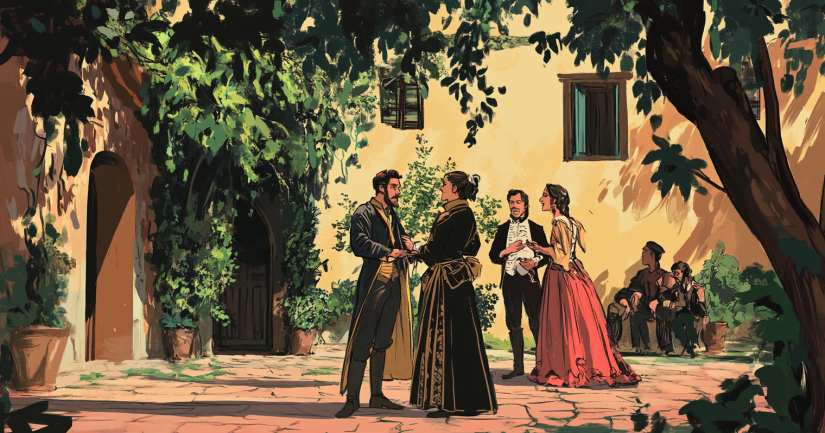
Unravel the hilarity and heartfelt moments of the play with the Taming of the Shrew Act 4 Scene 4 Quiz. This engaging challenge offers a chance to dive deep into the witty exchanges and intriguing developments of this classic play. As you journey through the questions, you’ll uncover the clever dynamics and underlying themes that make this scene so memorable.
In this part of the play, characters reveal their true intentions and alliances shift. You will explore the intricate dance of deception and humor as the plot thickens. The quiz will test your understanding of the characters’ motivations and the significance of their actions. Each question encourages you to think critically about the dialogue and its impact on the story’s progression.
Lucentio’s secret marriage plan is in motion, but will everything go smoothly? Find out in Taming Of The Shrew Act 4 Scene 5 Quiz as the deception nears its breaking point. If you want to see how the plot thickened earlier, revisit Taming Of The Shrew Act 4 Scene 3 Quiz. And for those feeling confident in their knowledge of the play, take on the Taming Of The Shrew Full Book Quiz to test yourself from start to finish.
Through this quiz, you’ll gain a richer appreciation for Shakespeare’s craft. You’ll see how he masterfully weaves comedy and tension, keeping audiences enthralled. Whether you’re a seasoned Shakespeare enthusiast or new to the Bard’s work, this quiz promises to enhance your knowledge and enjoyment of the play. Dive in and experience the wit and wisdom of The Taming of the Shrew!
Taming Of The Shrew Quizzes: Explore Petruchio and Katherina’s fiery romance …
What Happened – Taming Of The Shrew Act 4 Scene 4
In Act 4, Scene 4 of Taming of the Shrew, several events unfold. Tranio, still disguised as Lucentio, and the real Lucentio arrive in Padua. They are with Biondello, Lucentio’s servant. They are looking for someone to play Lucentio’s father, Vincentio. They need someone to assure Baptista that the dowry is ready.
Tranio finds a Pedant, a traveling teacher, and convinces him to pretend to be Vincentio. Tranio tells the Pedant that there is a law in Padua that requires travelers from Mantua to disguise themselves. He persuades the Pedant to help them by pretending to be Lucentio’s father. The Pedant agrees to the plan.
Meanwhile, Baptista and Tranio, still pretending to be Lucentio, meet. Baptista is concerned about the dowry for his daughter, Bianca. Tranio assures Baptista that the dowry is ready and introduces the Pedant as Vincentio. Baptista believes the Pedant is Lucentio’s father and is satisfied with the dowry arrangement.
Baptista decides to finalize the marriage agreement. He suggests they go to Lucentio’s house to discuss further details. Baptista, Tranio, and the Pedant leave together to talk more about the marriage contract.
The scene ends with Biondello instructing Lucentio to secretly marry Bianca at a church while Baptista is occupied. Lucentio agrees to the plan, hoping it will work without any problems.
Taming Of The Shrew Act 4 Scene 4 – Quotes
- “The more my wrong, the more his spite appears.” – Tranio, ‘Expresses the frustration of being trapped in a deceptive scheme.’
“Love wrought these miracles.” – Lucentio, ‘Acknowledges the power of love in achieving seemingly impossible tasks.’
“Fear not, my love, but stay.” – Lucentio, ‘Assures his beloved of his commitment amidst their secretive plans.’
“Exeunt BIONDELLO, TRANIO, and PEDANT, as fast as may be.” – Stage Direction, ‘Highlights the urgency and chaos as the characters scramble to maintain their disguises.’
“I am content.” – Vincentio, ‘Demonstrates resignation to the unfolding chaos and mistaken identities.’
“O, we are spoiled, and yonder he is!” – Biondello, ‘Reveals panic upon realizing their plot might be exposed.’
“My cake is dough.” – Tranio, ‘Uses a metaphor to express disappointment over the failed plan.’
“Sir, to your pleasure humbly I subscribe.” – Pedant, ‘Shows submission to Lucentio’s father, adding to the comedic misunderstandings.’
“See to your mistress.” – Biondello, ‘Instructs to ensure the continuation of the deception.’
“Why, this is flat knavery, to take upon you another man’s name.” – Vincentio, ‘Confronts the fraudulent impersonation, central to the play’s theme of identity.’
Taming Of The Shrew Act 4 Scene 4 – FAQ
Act 4, Scene 4 centers on the further development of the subplot involving Lucentio and Bianca. In this scene, Lucentio, disguised as Cambio, continues his pursuit of Bianca’s love. Meanwhile, Tranio, disguised as Lucentio, tries to secure Baptista’s approval for the marriage.
This scene amplifies the theme of disguise and deception, which is prevalent throughout the play. Characters continue to assume false identities to achieve their goals. Lucentio and Tranio’s disguises allow them to manipulate situations to their advantage, demonstrating the lengths to which individuals will go for love and personal gain.
In Act 4, Scene 4, Tranio, disguised as Lucentio, plays a crucial role in advancing Lucentio’s courtship of Bianca. He negotiates with Baptista, Bianca’s father, to secure his favor for the marriage. Tranio’s cunning and quick thinking highlight his importance as a loyal and resourceful servant.
The subplot mirrors and contrasts the main plot involving Petruchio and Katherina. While Petruchio attempts to tame Katherina, Lucentio employs deception and charm to win Bianca’s affection. Both plots explore themes of love, power dynamics, and societal expectations in relationships, adding depth and complexity to the play.
Shakespeare employs various literary devices in this scene, including dramatic irony and wordplay. The audience is aware of the true identities of the characters, creating dramatic tension. Additionally, the witty exchanges between characters showcase Shakespeare’s skillful use of language to entertain and engage the audience.
